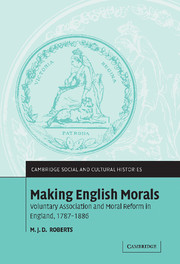Book contents
- Frontmatter
- Contents
- Preface
- Acknowledgements
- List of abbreviations
- Introduction
- 1 Moral reform in the 1780s: the making of an agenda
- 2 ‘The best means of national safety’: moral reform in wartime, 1795–1815
- 3 Taming the masses, 1815–1834
- 4 From social control to self-control, 1834–1857
- 5 Moral individualism: the renewal and reappraisal of an ideal, 1857–1880
- 6 The late Victorian crisis of moral reform: the 1880s and after
- Conclusion
- Select bibliography
- Index
1 - Moral reform in the 1780s: the making of an agenda
Published online by Cambridge University Press: 01 July 2009
- Frontmatter
- Contents
- Preface
- Acknowledgements
- List of abbreviations
- Introduction
- 1 Moral reform in the 1780s: the making of an agenda
- 2 ‘The best means of national safety’: moral reform in wartime, 1795–1815
- 3 Taming the masses, 1815–1834
- 4 From social control to self-control, 1834–1857
- 5 Moral individualism: the renewal and reappraisal of an ideal, 1857–1880
- 6 The late Victorian crisis of moral reform: the 1880s and after
- Conclusion
- Select bibliography
- Index
Summary
William Wilberforce, 28 October 1787
‘God Almighty has set before me two great objects; the suppression of the slave trade and the reformation of manners.’ So confided the recently converted Member of Parliament for Yorkshire, William Wilberforce, in a diary entry set down on 28 October 1787. The first of his objectives, being determinate, and having entered the realm of historical ‘fact’, has attracted the attention of historians without undue effort. The second object, being indeterminate, indeed indefinable except in culturally relative terms, has attracted less sustained and certainly less sympathetic attention. Yet Wilberforce spoke for a wide cross-section of his contemporaries in drawing attention to the depravity of the age in matters of morals and manners, and he touched a nerve which could be activated in sections of English society far beyond the limits of the doctrinally committed. This becomes clear when one looks to his correspondence and the evidence of those with whom he came into contact.
Wilberforce had started at the top. Already, in the spring of 1787, he had successfully played on the susceptibilities of the archbishop of Canterbury and of Queen Charlotte in order to induce the King in Privy Council to consent to a royal proclamation against vice and immorality. This proclamation was issued on 1 June and duly forwarded by the Secretary of State to county authorities.
- Type
- Chapter
- Information
- Making English MoralsVoluntary Association and Moral Reform in England, 1787–1886, pp. 17 - 58Publisher: Cambridge University PressPrint publication year: 2004
- 2
- Cited by

